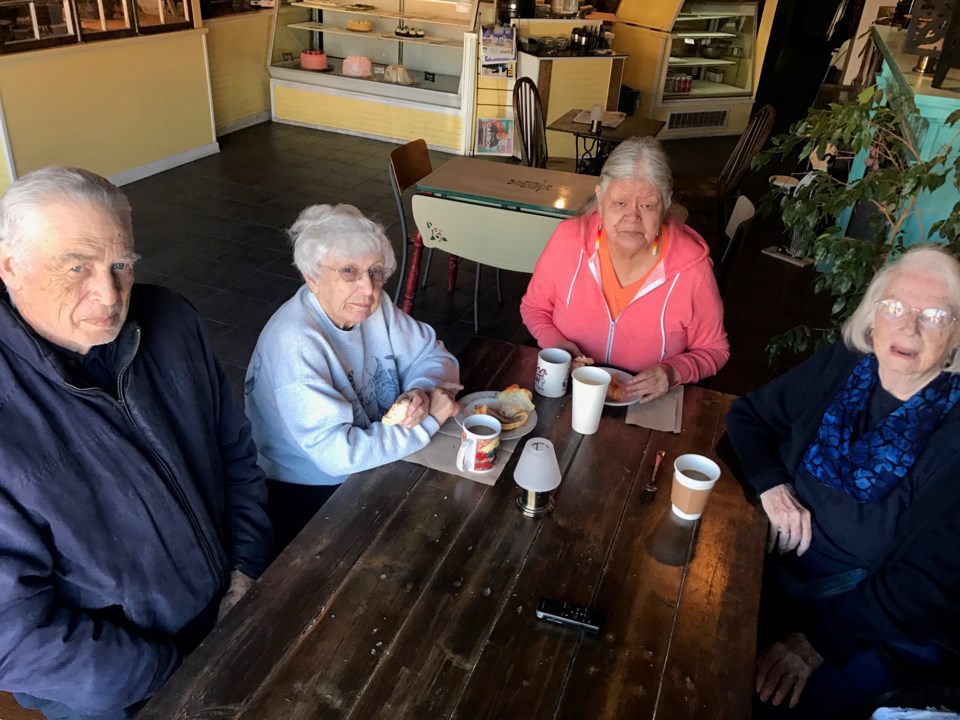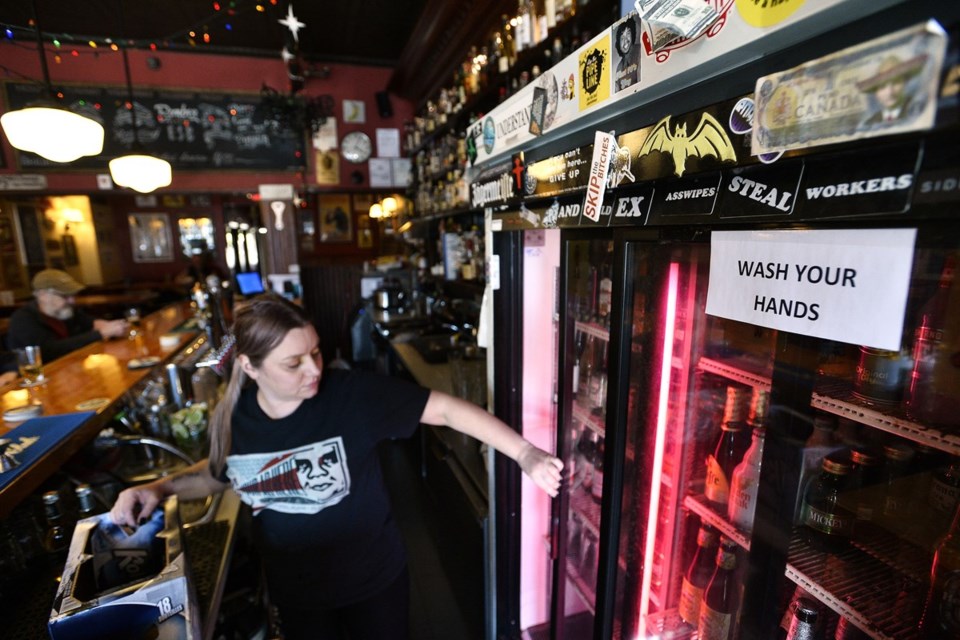Midway through Monday, a handful of men relaxed with a beer at The Brighton pub in Hastings-Sunrise.
Behind the counter, Aimee Braun admitted to being anxious about her future if concerns over COVID-19 end up forcing businesses like The Brighton to close in the coming days or weeks — it’s one of her two service-industry jobs.
The 36-year-old isn’t sure how she’ll manage financially if that happens, but she hopes the government steps in with financial support for service workers.
“If I don’t have [these] jobs, I don’t have anything,” she said.
Braun’s boss Nigel Lutz is also worried.
Aside from The Brighton, he owns The Yard and The Blind Rabbit. Lutz said everyone has noticed a change in all businesses over the last few days and he fears for his staff, as well as the ability of small businesses to survive.
“COVID-19 is all everyone talks about and people are very concerned. As a business that deals directly with consumers, we are nervous about what is to come. It is only a matter of days before restaurants and bars will be ordered to close due to the fear of the virus spreading. Our concern is how will our staff be able to handle the layoffs? Servers in the hospitality industry generally rely on gratuities to supplement their income. EI only covers so much and there has been no word on how, or if, financial support will be given to people whose livelihoods are affected,” he wrote in an email to the Courier.
“For all of us, rent still has to be paid, phone bills, car payments, mortgages etc. To my knowledge, the banks haven't passed any of the savings onto consumers that they've received from the federal government. Without any support from government, I predict that a lot of small businesses will go bankrupt and it will take years for people to recover from this emergency.”
The Brighton has taken steps to address concerns about coronavirus.
Karaoke and trivia nights have been cancelled until further notice, and Lutz has “drastically increased” cleaning routines. Staff no longer give bottles or cans with a glass to the customer directly. Instead, staff pour it for them.
“We will continue day by day and try to adapt as things unfold, hoping that this is all over sooner rather than later,” he said.
When it will be over is anyone’s guess, with the federal, provincial and municipal governments announcing new measures daily, and sometimes hourly, to combat the virus, including, earlier today, border closures and the shutdown of libraries and community centres. Then, late Monday, on CBC's On the Coast, Mayor Kennedy Stewart unexpectedly announced all bars and restaurants in the downtown core will be closed for one day March 17 — St. Patrick's Day.
Hours earlier, meanwhile, foot traffic on East Hastings in Hastings-Sunrise seemed steady, and only a few wore masks. Official messages to keep a one-metre "social distance" between people, for one's own health and others health, didn't appear to have reached all quarters. Some businesses were busier than others — Rio Meats had been swamped with customers over the past four days but was well stocked.
A handful of people sipped coffee at Black Rook Bakehouse, including a foursome of seniors, who’ve been meeting for coffee twice a week for 15 years. The group’s numbers used to be larger but a few have passed on, leaving Margaret Peterson, 82, Kathy Cooke, 75, Shirley Hargreaves, 92, and Andrew Hattrick 84, to keep up the tradition. Hargreaves and Hattrick have lived next door to each other for 60-plus years.
The coffee meetings provide an opportunity for the seniors to socialize and they plan to continue getting together unless government officials say otherwise or if restaurants or coffee shops are shut down over concerns about COVID-19.
Seniors, especially those with underlying health concerns, suffer the worst outcomes if they’re infected with the virus. The provincial government announced Monday it would limit access to long-term care homes and acute care facilities.
But as that news was emerging, Hargreaves, who uses a walker, was pulling up to the table at the Black Rook.
After sitting down, she immediately took a small bottle of hand sanitizer from her purse and squeezed a dollop onto her hands. Hargreaves said she looks forward to seeing her friends.
“If I don’t get out the two days a week that I do, I think I’ll start climbing the walls,” she said.
But she’s aware of the gravity of the coronavirus situation — her daughter and son-in-law are stuck on a European cruise.
Being over 80, Peterson said she’s worried about her health but she’s taking things “day by day.” She keeps active and usually volunteers at a community centre craft store Monday mornings, but the store and the lunchroom had closed down.
She still shops for groceries on her own but otherwise spends a lot of time watching TV. Like her volunteer work, the coffee group is a lifeline.
“It’s just a chance to talk to another living person,” she said. “A lot of seniors don’t have social interaction at all.”
Hattrick said he isn’t too worried, but has been taking precautions — he tries to keep his distance from people and washes his hands. He doesn’t go to crowded places.
“Generally, I don’t worry too much being out unless someone is coughing in front of me,” he said.
If they’re eventually forced to stay home, the seniors said they’d support each other and go for walks to avoid feeling cooped up.
Hattrick, meanwhile, said his mother had gone through a similar global health crisis during her time — she and her family were homesteading north of Edmonton during the time of the Spanish flu and survived.




